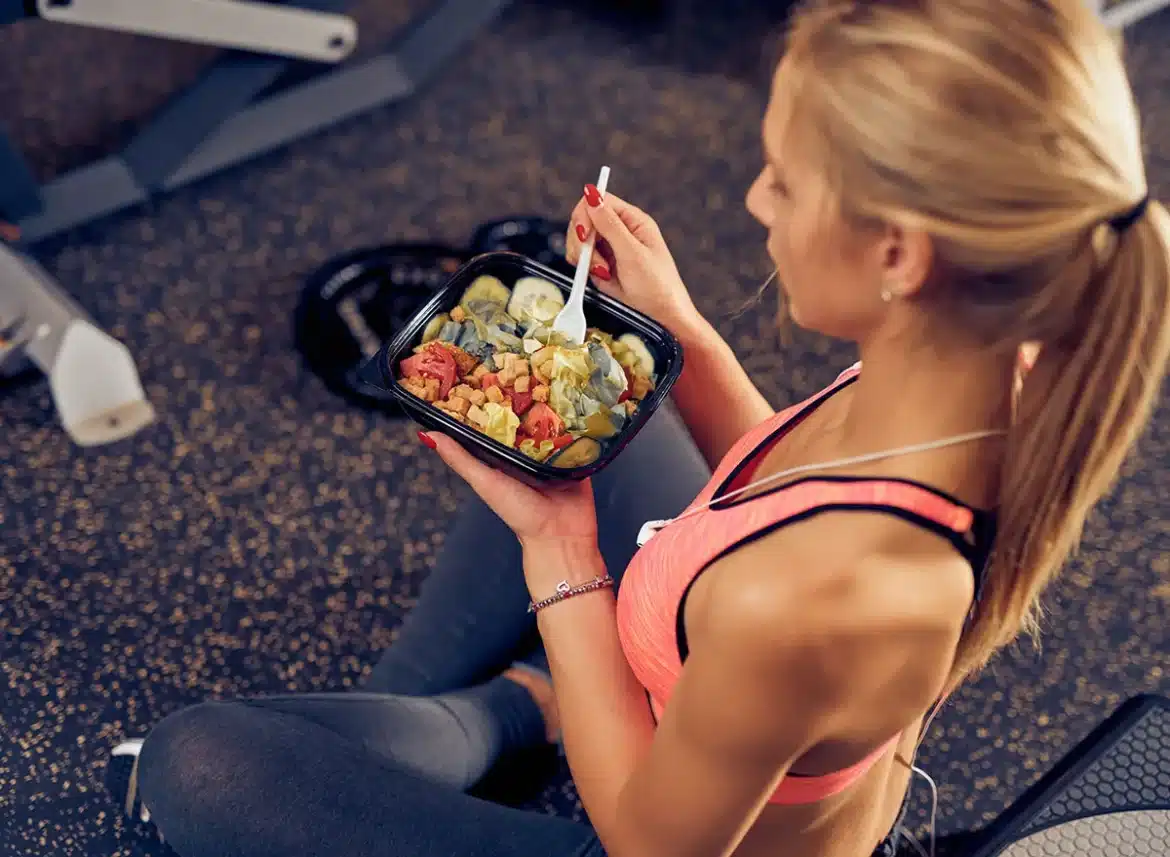Introduction
What To Eat In The Morning Before Gym: Starting your day with the right nutrition can significantly impact your workout performance and overall health. Preparing your body with a balanced meal in the morning can provide the energy, nutrients, and hydration needed to power through a gym session. Discovering the ideal foods to eat before hitting the gym can set the tone for a productive and rewarding fitness routine.
As the sun rises and you gear up for a morning gym session, fueling your body properly becomes a priority. The breakfast you choose can determine your energy levels, focus, and endurance during exercise. Optimal morning nutrition involves a combination of carbohydrates, protein, healthy fats, and hydration.
Remember that personal preferences, dietary restrictions, and eat before workout intensity can influence your food choices. Tailor your pre-gym meal to suit your needs, whether you’re aiming for a high-intensity workout or a lighter training session. By incorporating the right nutrients, you’ll not only elevate your gym performance but also lay the foundation for a day of vitality and well-being.

What should I eat at morning before gym?
If you plan to exercise within an hour after breakfast, eat a light breakfast or drink something such as a sports drink. Focus on carbohydrates for maximum energy. Good breakfast options include: Whole-grain cereals or bread.
Eating the right foods before your morning gym session can provide you with the energy and nutrients needed for an effective workout. Here’s a list of options to consider for your pre-gym morning meal:
Complex Carbohydrates:
Oatmeal: Rich in fiber and slow-digesting carbs, oatmeal provides sustained energy.
Whole Wheat Toast: A slice of whole-grain toast with nut butter offers a balanced carb-protein combo.
Quinoa: A protein-packed grain that also contains carbohydrates for sustained energy.
Protein Sources:
Eggs: A versatile option with complete protein and essential nutrients.
Greek Yogurt: High in protein and probiotics for digestion.
Cottage Cheese: Packed with protein and low in fat.
Fruits:
Berries: Blueberries, strawberries, or raspberries provide antioxidants and natural sweetness.
Banana: A quick source of carbohydrates and potassium for muscle function.
Healthy Fats:
Avocado: Loaded with healthy fats and fiber, it can be added to toast or smoothies.
Nuts and Seeds: A handful of almonds, walnuts, or chia seeds adds healthy fats and crunch.
Smoothies:
Blend fruits, leafy greens, protein powder, and a liquid base (water, milk, almond milk) for a convenient and nutrient-rich option.
Hydration:
Water: Hydrate before your workout to support energy levels and performance.
Timing:
Aim to eat 1 to 2 hours before your workout to allow for digestion.
A smaller snack can be consumed 30 minutes to an hour before exercise.
Remember that personal preferences and dietary needs vary. Focus on creating a balanced meal that includes a combination of carbohydrates, protein, and healthy fats. Avoid heavy or greasy foods that might cause discomfort during exercise.
Experiment with different options to find what works best for you. Listen to your body, and pay attention to how different foods impact your energy levels and performance. A well-rounded pre-gym meal will help you maximize your workout potential and set a positive tone for the rest of your day.
Should you eat before gym in the morning?
To effectively fuel your workout, you need to eat far enough ahead of time for it to be properly digested and made available as energy. In other words, your portion size should depend on how soon your workout is after you eat. Generally speaking, you should try to eat an hour to 90 minutes before exercising.
However, the timing of your meal matters. It’s best to eat about 1 to 2 hours before your workout to allow for digestion. A larger meal might require more time to settle, while a smaller snack can be consumed 30 minutes to an hour before exercise.
If you prefer working out on an empty stomach, a small snack like a banana or a handful of nuts might be sufficient to provide a quick source of energy. Keep in mind that individual responses vary, so it’s important to listen to your body and find the timing and foods that work best for you.
In any case, stay hydrated by drinking water before, during, and after your workout. Pay attention to your body’s cues, and adjust your pre-gym eating habits based on your energy levels and workout intensity.
What should I eat 30 minutes before a workout?
Your body can start extracting small amounts of energy from low glycemic carbohydrates, such as fruit, grainy bread, and oats, within 15-30 minutes of consuming the foods. Elevating your blood glucose levels and beginning to store this energy in your muscles, in the form of glycogen.
If you’re looking to eat 30 minutes before a workout, it’s best to opt for easily digestible foods that provide a quick source of energy without causing discomfort during exercise. Here are some options to consider:
Banana: A banana is a convenient and easily digestible choice. It provides carbohydrates for energy and potassium to support muscle function.
Greek Yogurt: A small serving of Greek yogurt offers protein for muscle support and carbohydrates for energy. Choose plain yogurt to avoid added sugars.
Fruit Smoothie: Blend a mix of fruits like berries, a banana, and a liquid base (water, almond milk) for a refreshing and quick energy boost.
Energy Bar: Choose a bar that is low in fiber and contains a good balance of carbohydrates and a bit of protein. Look for options with minimal added sugars.
Applesauce: Unsweetened applesauce is easy to digest and provides carbohydrates for energy.
Rice Cakes: A couple of rice cakes with a thin layer of nut butter can provide both carbs and a touch of healthy fats.
Oats: If you can tolerate them well, quick-cooking oats can be prepared quickly and provide complex carbohydrates for sustained energy.
Honey or Maple Syrup: A small amount of natural sweetener can provide a quick source of easily digestible carbs.
Remember that the goal of a snack 30 minutes before a workout is to provide a rapid energy source without overloading your stomach. Avoid heavy or high-fiber foods that might cause discomfort during exercise. Hydration is also important, so make sure to drink water before and during your workout.
Can we workout empty stomach?
Exercising in a fasted state may burn some quick body fat, but it’s not the best option for your body in the long-run. Eat a small snack or meal before and after your workout to ensure that you’re properly fueled to perform your best in the gym and recover quickly when you get home.
Yes, it’s possible to work out on an empty stomach, and some people find it works well for them. This approach is often referred to as “fasted exercise.” However, whether or not working out on an empty stomach is suitable for you depends on various factors, including your individual preferences, goals, and the type of workout you’re planning.
Here are some considerations to keep in mind:
Advantages:
Fat Burning: Fasted exercise may encourage the body to use stored fat for energy, which can be beneficial for those aiming to burn fat.
Simplicity: Working out on an empty stomach can be more convenient, as there’s no need to plan and prepare a pre-workout meal or snack.
Digestive Comfort: Some individuals find that exercising on an empty stomach reduces the risk of gastrointestinal discomfort during their workout.
Considerations:
Energy Levels: Some people might experience reduced energy and stamina during intense workouts when exercising on an empty stomach.
Muscle Preservation: If you’re aiming to build muscle, having a source of protein before or after your workout can be beneficial for muscle repair and growth.
Hydration: Even when working out fasted, it’s important to stay hydrated. Drink water before and during your workout to prevent dehydration.
Individual Response: People’s responses to fasted exercise vary. Some may feel energized, while others might experience lightheadedness or fatigue.
Type of Workout: Fasted exercise might be better suited for lower-intensity activities like walking, yoga, or light cardio. High-intensity or endurance workouts might require more fuel.
Guidelines:
Listen to Your Body: Pay attention to how your body responds to working out on an empty stomach. If you feel dizzy, lightheaded, or excessively fatigued, it might be better to have a small snack.
Stay Hydrated: Even though you’re not eating, stay hydrated by drinking water before and during your workout.
Post-Workout Nutrition: If you choose to work out fasted, consider having a balanced meal or snack after your workout to replenish energy stores and support muscle recovery.
Ultimately, whether you work out on an empty stomach or not is a personal choice. It’s important to find what works best for your body, your fitness goals, and your comfort level. If you’re unsure, experimenting with different approaches and listening to your body’s cues can help you determine what works best for you.
Is curd good for pre-workout?
Curds or dahi contain calcium and proteins and a bit of natural sugar present in small quantities. Because it is easy on the stomach and the digestive system, it’s a great option to consume it before an intense workout. Adding some whole grain cereal, fruits or honey to yoghurt will give you a quick energy boost.
Yes, curd (also known as yogurt) can be a good option for a pre-workout snack for some people. Curd offers a combination of protein, carbohydrates, and healthy fats, making it a versatile choice to provide sustained energy and support muscle function during your workout. However, its suitability depends on your individual preferences, digestive comfort, and the type of exercise you’ll be doing.
Consider adding a small amount of fresh fruit, such as berries or a banana, for additional carbohydrates and natural sweetness.
Eat your curd snack about 30 minutes to an hour before your workout to allow time for digestion.
It’s important to note that individual responses to foods vary. Some people may find curd sits well with them and provides the energy they need, while others might experience discomfort. If you’re trying curd for the first time before a workout, consider doing so on a day when you have a less intense exercise session to see how your body responds.
As always, listening to your body’s cues and finding what works best for you is key when choosing pre-workout snacks. If curd doesn’t suit you, there are plenty of other options to consider.
Can I eat banana before workout?
They’re also easy to digest and can slow the absorption of sugar in the bloodstream, making bananas a great snack option before your next workout. Enjoy bananas alone or try pairing them with a good source of protein like yogurt or peanut butter for an easy pre-workout snack.
Yes, eating a banana before a workout can be a great choice for many people. Bananas are a convenient and nutrient-rich fruit that provides a quick source of energy, making them an excellent pre-workout snack. Here’s why a banana can be a good option:
Carbohydrates: Bananas are rich in carbohydrates, particularly natural sugars like glucose and fructose. These sugars provide a quick and easily digestible source of energy, which can help fuel your workout.
Potassium: Bananas are a good source of potassium, an electrolyte that helps regulate fluid balance, muscle contractions, and nerve signals. Potassium can be beneficial for preventing muscle cramps during exercise.
Digestibility: Bananas are gentle on the stomach and are usually well-tolerated before workouts, even for people with sensitive digestion.
Convenience: Bananas are portable and require minimal preparation, making them an ideal on-the-go snack.
Satiety: The fiber content in bananas can help you feel full and satisfied without causing discomfort during your workout.
If you choose to eat a banana before your workout:
Aim to eat it about 30 minutes to an hour before your exercise session to allow for digestion.
Consider pairing it with a small amount of protein, such as a handful of nuts or a spoonful of nut butter, to provide sustained energy.
However, keep in mind that individual responses to foods vary. Some people might find a banana to be an excellent pre-workout snack, while others might prefer different options. If you’ve never had a banana before a workout, you might want to give it a try on a day when you have a less intense exercise session to see how your body responds. As with any pre-workout snack, listening to your body and finding what works best for you is key.
What is pre-workout meal?
1/8. The best things to eat 30 minutes before a workout include oats, protein shakes, bananas, whole grains, yogurt, fresh fruit, and more. An ideal pre-workout meal should be low in fat, moderate in protein, and high in complex carbs.
A pre-workout meal is a meal or snack that you consume before your exercise session to provide your body with the energy, nutrients, and hydration needed to fuel your workout and optimize your performance. The goal of a pre-workout meal is to prepare your body for the physical demands of exercise, enhance your endurance, and support muscle function.
Examples of pre-workout meals include:
Grilled chicken breast with quinoa and steamed vegetables.
Oatmeal topped with berries, a scoop of Greek yogurt, and a drizzle of honey.
Whole grain toast with avocado and a boiled egg.
Brown rice with lean protein (chicken, tofu, or fish) and a side of sautéed greens.
Ultimately, the composition of your pre-workout meal will depend on your individual dietary preferences, workout intensity, and goals. It’s important to experiment and find what works best for your body. Additionally, be attentive to how different foods make you feel during your workout to determine the optimal pre-workout meal for your needs.
Is milk good for pre-workout?
Because milk is hydrating, portable, not overly filling and readily available, it can be an excellent pre-exercise food choice and can also be consumed during exercise to sustain you during a long workout (more than 90 minutes).
Yes, milk can be a good option for a pre-workout beverage or ingredient in a pre-workout meal. Milk provides a combination of carbohydrates, protein, and hydration, making it a versatile choice to fuel your workout. Here’s why milk can be beneficial:
Carbohydrates: Milk contains lactose, a natural sugar that provides a source of carbohydrates. Carbohydrates are important for providing energy to sustain your workout.
Protein: Milk is a source of protein, which is essential for muscle repair and growth. The protein content in milk can help prevent muscle breakdown during exercise.
Hydration: Milk has a high water content, contributing to hydration before your workout.
Nutrients: Milk is rich in essential nutrients such as calcium, vitamin D, and B vitamins, which support bone health, energy metabolism, and overall well-being.
Satiety: The combination of carbohydrates and protein in milk can help you feel satisfied and fueled during your workout.
If you’re considering milk as part of your pre-workout routine:
Opt for low-fat or skim milk to keep the fat content moderate.
If you’re sensitive to lactose or prefer plant-based options, you can consider alternatives like almond milk, soy milk, or oat milk.
If you prefer a beverage, a glass of milk can be consumed about 30 minutes to an hour before your workout.
If you’re looking for a more substantial pre-workout meal, you can incorporate milk into options like a smoothie with fruits, protein powder, and a small amount of healthy fats.
Keep in mind that individual responses to foods vary. Some people might find milk to be an excellent pre-workout choice, while others might prefer different options. As with any pre-workout food or drink, it’s important to listen to your body’s cues and find what works best for you in terms of energy, digestion, and comfort during your workout.

Conclusion
Choosing the right morning meal before hitting the gym is a proactive way to optimize your workout experience and foster a healthier lifestyle. The blend of nutrients you consume sets the tone for your energy levels, focus, and endurance throughout your exercise routine. By prioritizing a balanced combination of complex carbohydrates, protein, healthy fats, and adequate hydration, you’re effectively giving your body the tools it needs to perform at its peak.
As you explore different breakfast options and timings, keep in mind that individual preferences and workout goals vary. What works best for one person might not suit another, and that’s perfectly okay. The key lies in finding the harmony between your body’s requirements and your personal choices.
By incorporating nutrient-rich foods into your morning before gym routine, you’re not only enhancing your workout performance but also establishing a foundation for overall health and well-being. The dedication you put into nourishing your body translates into greater resilience, vitality, and satisfaction in every aspect of your life.
Ultimately, your pre-gym meal isn’t just a mere step in your fitness regimen—it’s a declaration of your commitment to self-care and empowerment. Armed with the right nutrition, you’re setting yourself up for success, not only in the gym but also in your pursuit of a healthier and more vibrant existence. So, make every bite count, relish the journey of self-discovery through food, and harness the power of nutrition to elevate your morning workouts to new heights.

